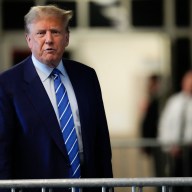By Vivian Sequera and Mayela Armas
CARACAS (Reuters) – Venezuela’s pro-government legislature on Monday agreed to create a commission to evaluate holding 2020 legislative elections early, which would create an opportunity for the government to reclaim control of the opposition-dominated congress.
Opposition leader Juan Guaido warned on Sunday that the Constituent Assembly would decide on Monday to disband the congress he leads and move up elections after President Nicolas Maduro called for a new “offensive.”
Instead, the Constituent Assembly’s head, Diosdado Cabello, downplayed Guaido’s comments and said there was no need to disband congress as it “didn’t work” and “had eliminated itself on its own.”
Any move to disband congress would fuel criticism of Maduro in the international community and almost certainly halt Norway-brokered talks between the government and Guaido allies meant to reach a negotiated solution to Venezuela’s political stalemate.
Cabello said the commission would evaluate “in accordance with the law, the constitution and the political situation” when would be the best moment for the legislative elections.
In a warning directed at opposition lawmakers, Cabello said: “Don’t go on vacation because we are going to make life impossible for you over the next month.”
Earlier on Monday, the Supreme Court said it accused three opposition lawmakers of treason and conspiracy, in addition to 21 other deputies the court has charged with similar crimes since 2018. Of those accused, two lawmakers remain under arrest while most others have either fled the country or sought refuge in friendly embassies.
Congressional elections are held every five years and are not scheduled until December 2020.
The opposition in 2015 won a two-thirds majority of congress in a landslide vote, taking control for the first time in 16 years. Maduro’s government refused to recognize any of its decisions, and the Supreme Court has shot down every measure it approved.
In 2017, Maduro launched an election to create the Constituent Assembly, an all-powerful body that is officially tasked with rewriting the constitution but in practice functions as a parallel legislature with no checks on its power.
The opposition broadly boycotted that vote, and the creation of the institution was criticized around the world as undermining democracy.
Guaido invoked the constitution in January to assume a rival presidency, saying Maduro’s 2018 re-election was fraudulent. He has been recognized by more than 50 countries, including the United States, as Venezuela’s legitimate president.
Maduro said on Saturday that Guaido will face justice for supporting the most recent round of U.S. sanctions, which block all commercial transactions with Venezuela’s government and freeze its assets in the United States.
(Reporting by Vivian Sequera and Mayela Armas, writing by Brian Ellsworth; Editing by Steve Orlofsky and Cynthia Osterman)

















